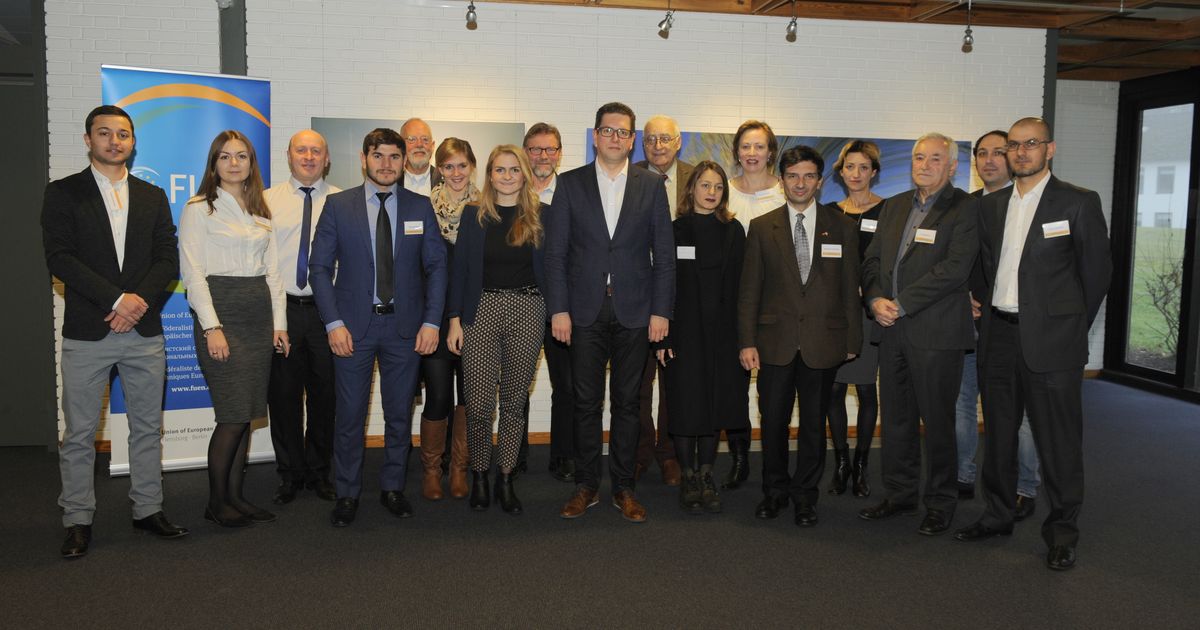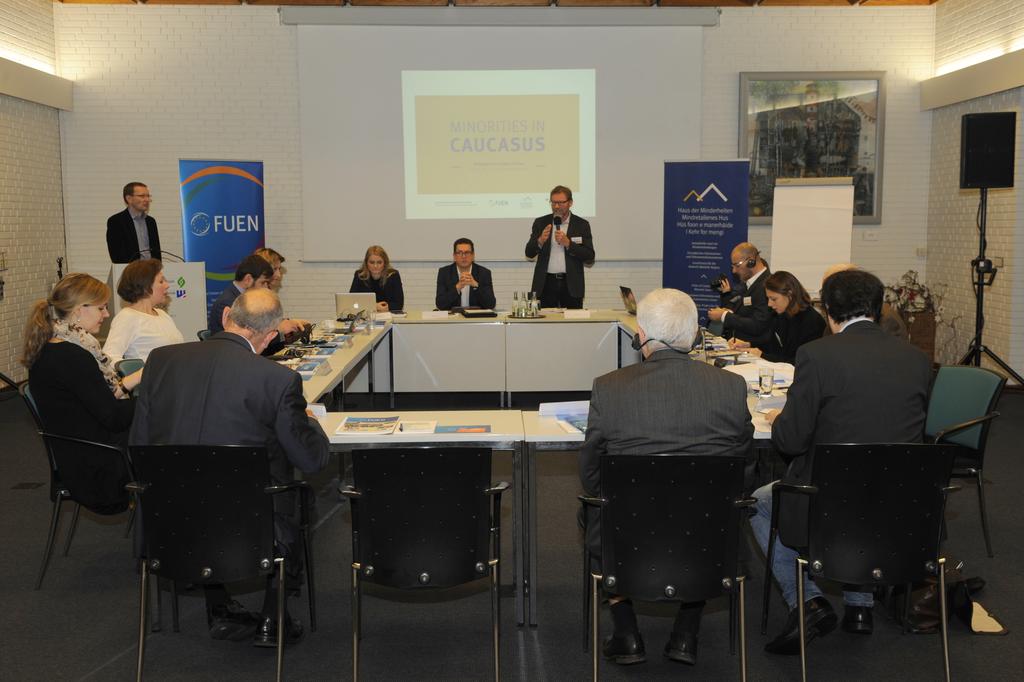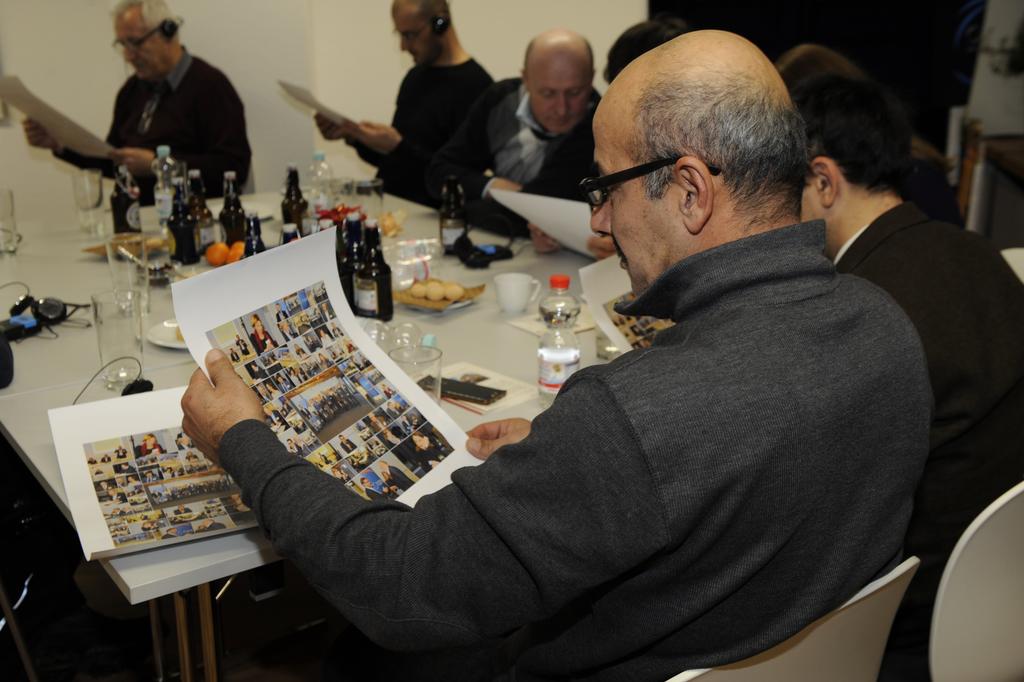
Minorities in Caucasus: Dialogue, trust and a strong civil society are worth a mint
19.12.2016On 15 December 2016 on invitation of the FUEN and carried out as an event of the House of Minorities interesting discussions were taking place within the framework of the project ‘Minorities in Caucasus – Dialogue for a stable future’ regarding the challenges of the minorities in Caucasus and the minority model of the German-Danish border region as a good example.
In his welcoming speech FUEN President Loránt Vincze pointed out that conflicts in the Caucasus aren’t sufficiently noticed in the West and that this project offers the minorities in Caucasus the possibility to describe the situation from their perspective and to explain which challenges they are facing. Mr Vincze invited everybody to put facts as well as feelings on the table and to initiate an open dialogue in order to discuss future goals.
The second day of the seminar started with an introduction to the history of the German-Danish border region by YEN-President Britta Tästensen. Afterwards Zora Popova from ECMI (European Centre for Minority Issues) gave a presentation about the development of the German-Danish border model and emphasized the importance of collaboration on a political, economical, cultural and educational level. With regard to the question of transferability of the German-Danish border model Popova underlined the high significance of trust and dialogue between majorities and minorities, the focus on common traits and the empowerment of civil society as a key success factor. In a following discussion the participants got the chance to speak about the situation of their minorities and to share thoughts on the transferability of the German-Danish border model.
The first dialogue meeting started with a keynote speech by FUEN Vice-President Gösta Toft, who explained ways of social participation, using the example of the German minority in Denmark, which were later on discussed under the leadership of FUEN Honorary President Hans Heinrich Hansen. It was pointed out that in order to achieve the aim of anti-discrimination and the development of a minority policy capable of acting; you do not only need goodwill but also a dialogue that takes place with the minorities on eye level and not by political parties about minorities. Moreover it was stressed that it is necessary to have a stable collaboration between majority and majority, between majority and minority as well as between minority and minority.
The second dialogue meetings dealing with the topic ‘Learning of minority languages and organisation of education systems’ started with a keynote speech by Anke C. Tästensen, headmaster of the German schools in Rapstedt and Osterhoist and member of a working group in the Institute for minority pedagogy. Anke Tästensen presented the structure and principles of the German School and Language Association for Northern Schleswig which includes a variety of kindergartens, schools and leisure facilities. FUEN Vice-President Olga Martens guided the discussion that also dealt with challenges like lack of teachers and ideas how to implement aspects of the Northern Schleswig school model.
During the last session current priorities and challenges of the minorities in Caucasus as well as the FUEN resolution by the FLNCA (Föderele Lezghin National und Kulturelle Autonomie), which was rejected for further discussion at the FUEN Congress 2016 in Breslau, were discussed.
The second day of the Caucasus project ended with a Caucasian cultural evening in the House of Minorities where the participants got the chance to present their minorities and traditions and to share their experiences of the day.
You can find more photos of this event on Flickr.


COMMUNIQUÉ DE PRESSE
- FUEN wishes you a peaceful Christmas season, restful days and a bright, hopeful start to the new year!
- FUEN calls on the EU to act over systematic ethnic-based land confiscations in Slovakia
- Women of Minorities conference in Budapest calls for structural change to ensure equal political participation of minority women
- FUEN President Olivia Schubert at UN Forum on Minority Issues in Geneva
- "Laboratory of Peace": 28th Seminar of Slavic Minorities held in European Capital of Culture Gorica/Gorizia
- Equality in Political Participation and Representation: Third “Women of Minorities” Conference to Be Held in Budapest
- FUEN Working Group on Education discusses challenges and future of minority schooling in Europe
- 28th Seminar of Slavic Minorities in Europe to take place in Gorica/Gorizia, Italy
- Olivia Schubert in her first interview as FUEN President
- FUEN Assembly of Delegates elects new leadership – Olivia Schubert becomes new President














